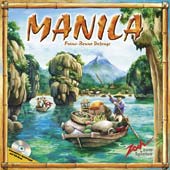A new batch of games from Adam Spielt arrived this week, so I was keen to try a couple of them. The first was Manila by Franz-Benno Delonge and released by Zoch (an English edition to be distributed by Rio Grande is in the pipeline).
The game concerns the shipment of four types of good by boat to the city of Manila. Each player starts with two random shares, secret from the other players, and the value of the shares will increase as more of the good is successfully shipped to Manila. However, the boats are not reliable and often fail to reach port with their cargo. Players hire accomplices, in the hope of earning money through their accomplices’ actions. The accomplices can be deployed in a variety of roles, with payment being determined by the success of that role. Those placed on boats will receive payment if the boat succeeds in reaching port; those working at the port get paid according to how busy the port is; at the shipyard, accomplices will be paid according to the number of boats needing repair; someone in the insurance office will gain or lose depending on how many boats fail to reach port; pilots can affect the likely success of the boats’ journeys but get no other payback; and pirates may be lucky to board or plunder the boats on their voyage.
The game is played over a number of rounds and each round has two main phases, plus some admin at the end of the round. The first phase involves the auctioning of the role of harbour-master for the round. Bidding goes around the table until all but one have dropped out. The harbour master gets four advantages: He can buy one share of a particular good (and the harbour master is the only person ever able to buy any shares, over the intitial two everyone receives at the start of the game). There are three boats available each round and each can only ship one type of good, (so one good is not shipped each round) and the harbour master determines which three will be transported. Thirdly, he gets to determine which boats have the furthest to travel to reach port. Finally he gets to place accomplices first in the second phase. The second phase involves placing accomplices and moving the boats. In turn, each player gets to place an accomplice into a role for the current journey and then the dice are rolled to move the boats towards port. This is done three times, following which the round ends. Accomplices are then paid out depending on whether or not each boat reached port. Then the share price of goods that were successfully shipped to Manila are increased. A new round then begins with another auction of the harbour master role. Rounds continue until one good’s share price has been increased four times, at which stage shares are redeemed and whoever has the most money wins the game.
In our game, Phil started out the strong leader. He was the only person to pick the pirate role for one of his accomplices in the first round and he came out with a huge profit, as a boat worth 30 landed on the pirate space after the third roll of the dice. We all “seemed” to be playing catch-up from then on. Money was very tight with three players taking loans during the game (Mark K took three, I think). Gaining the harbour master role is good but can leave you short of money when deploying your accomplices. Being able to buy a share though, especially early on, can be very lucrative if the share price of that good escalates considerably. Mark K seemed to like the idea of retaining the harbour master role, despite going into debt, as placement of accomplices first tends to be cheaper and gives one the opportunity of pinching the best roles before anyone else. Phil and I, being 2nd and 3rd in turn order behind the harbour master, were reasonably content to let Mark keep paying, while Nige was unhappy that there was no lucrative role left when it came round to the last player (him) placing accomplices. Maybe he should have pushed Mark K harder in the auctions, especially as Mark K would then still have been 2nd in turn order with Nige as harbour master. Eventually, I persuaded Phil to complete a fourth successful voyage for the beige good and end the game (as he looked to be miles ahead). Unfortunately, beige was the only really valuable share and Mark K and I were the ones holding most of these. Mark K’s indebtedness left me able to declare another win for me - much to Nige’s disgust: He would have been very happy for Phil or even Mark K to take the win but, for some reason, he wanted my loss record to be in an upward direction rather than the wins.
We all thought this was a very good, verging on excellent, gambling game. It’s all about playing the odds and whether you want to try for the big gains or play conservatively for small returns. After one playing, the big uncertainty is what the value of the harbour master is. It gives you a fair degree of control but you can still get stuffed by the actions of the pilots and the roll of the dice. Players’ choices are pretty straightforward but judging the best one is not easy. The game took about 80 minutes, but this really depends on the number of successful and unsuccessful voyages there are. Talking to Mark K the next day, we both wondered whether to move our ratings up slightly, as the game was very engaging with people involved all the time. This could see quite a bit of play and definitely needs a repeat playing to try out new things now we know how to play.
|

